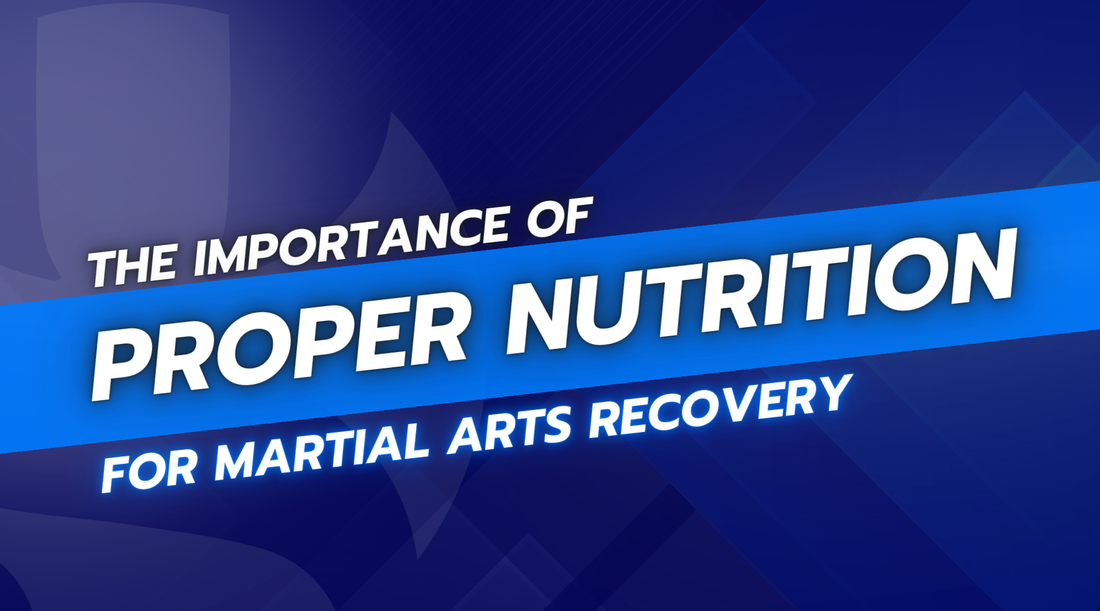
The Importance of Proper Nutrition for Martial Arts Recovery
Share
Recovery is a crucial aspect of martial arts training, often as important as the training itself. It’s during this recovery phase that your body heals, rebuilds, and gets stronger. While various factors contribute to effective recovery, nutrition plays a pivotal role. Understanding how proper nutrition aids in martial arts recovery can help athletes optimize their performance and longevity in the sport.
Understanding Martial Arts and Physical Demands
Martial arts encompass a range of disciplines, each with its unique techniques and training regimens. Whether it’s Brazilian Jiu-Jitsu, Muay Thai, Karate, or Taekwondo, these practices demand significant physical and mental exertion. Practitioners often engage in intense training sessions that challenge their strength, endurance, flexibility, and mental resilience. Such rigorous activity leads to muscle breakdown, energy depletion, and sometimes injuries, making recovery essential.
The Science Behind Recovery
Recovery in martial arts involves several physiological processes. After a strenuous workout, muscles experience micro-tears, glycogen stores deplete, and the body undergoes oxidative stress. Proper recovery allows these muscles to repair, energy levels to replenish, and overall well-being to restore. Without adequate recovery, the risk of overtraining, injury, and burnout increases, which can significantly hinder progress.
Nutrition's Role in Recovery
Proper nutrition supplies the body with the essential nutrients needed to repair tissues, replenish energy stores, and reduce inflammation. Nutritional needs vary based on the intensity and type of training, but the fundamental components include macronutrients (proteins, carbohydrates, and fats) and micronutrients (vitamins and minerals).
Protein: The Building Block
Proteins are vital for muscle repair and growth. After a training session, consuming enough protein helps in the rebuilding of damaged muscle fibers. Sources like lean meats, eggs, dairy, and plant-based options like beans and lentils provide high-quality protein. Including these in your diet ensures that your muscles get the necessary amino acids to recover effectively.
Carbohydrates: Fueling Energy
Carbohydrates are the primary source of energy for high-intensity workouts. They replenish glycogen stores, which are depleted during training. Consuming carbohydrates post-workout restores energy levels and supports recovery. Opt for complex carbohydrates like whole grains, fruits, and vegetables, which provide sustained energy release.
Fats: Essential for Recovery
Fats, particularly healthy fats, play a crucial role in reducing inflammation and promoting overall health. Omega-3 fatty acids, found in fish, flaxseeds, and walnuts, are particularly beneficial. Including these in your diet can help in managing inflammation and supporting joint health, essential for martial artists.
Hydration: The Unsung Hero
Staying hydrated is often overlooked but is vital for recovery. Water supports every metabolic function and nutrient transfer in the body. Drinking enough water before, during, and after training prevents dehydration, which can impair performance and recovery. Electrolyte-rich drinks can also help replenish lost minerals.
Vitamins and Minerals: Micronutrient Power
Vitamins and minerals are necessary for various bodily functions, including muscle contraction, energy production, and immune support. Key nutrients like vitamin C, D, calcium, and magnesium are crucial for recovery. Consuming a balanced diet rich in fruits, vegetables, nuts, and seeds can ensure you get these essential micronutrients.
Supplements: Do You Need Them?
While a well-balanced diet is typically sufficient, some athletes may benefit from supplements. Common supplements for recovery include protein powders, BCAAs (Branched-Chain Amino Acids), and omega-3s. However, it’s essential to approach supplements with caution, understanding their benefits and potential side effects. Consulting a nutritionist or healthcare provider is advisable before starting any supplement regimen.
Pre-Training Nutrition
What you eat before training can significantly impact your performance. A meal rich in carbohydrates and moderate in protein, consumed 2-3 hours before a workout, provides sustained energy. Snacks like a banana with peanut butter or a smoothie can be excellent pre-workout choices.
Post-Training Nutrition
Post-workout nutrition is critical for recovery. Consuming a mix of protein and carbohydrates within 30 minutes to an hour after training aids in muscle repair and glycogen replenishment. Meals like grilled chicken with quinoa and vegetables or a protein shake with fruit are excellent options.
Meal Planning and Preparation
Effective meal planning ensures you have nutritious options readily available, reducing the temptation to opt for unhealthy choices. Preparing meals in advance can save time and ensure balanced nutrition. Simple recipes like overnight oats, grilled salmon with veggies, or turkey wraps can make healthy eating convenient and enjoyable.
Listening to Your Body
Understanding and responding to your body’s signals is crucial. Symptoms like constant fatigue, frequent injuries, or slow recovery can indicate nutritional deficiencies. Adjusting your diet based on these signs, possibly with the help of a nutritionist, can help optimize recovery and performance.
Final Thoughts
Proper nutrition is indispensable for martial arts recovery. It provides the building blocks for muscle repair, replenishes energy, and supports overall health. By paying attention to your nutritional needs and making informed choices, you can enhance your recovery, improve performance, and ensure long-term success in martial arts.
